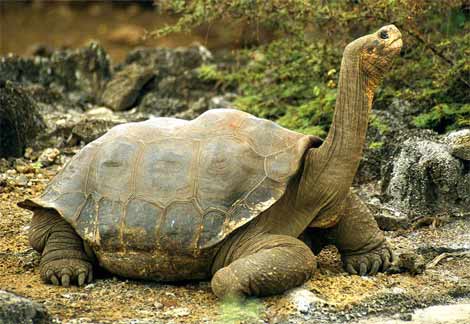Old Creatures Great and Small

Some 30 years ago, my family and I went to the Galapagos Islands, rented a cabin cruiser and (sort of) followed the path of Charles Darwin, who had visited the islands in the 1830s and came up with his theory on the origin of species.
A fond memory is slogging deep into one of the islands and finding a colony of giant tortoises, one of which was celebrated as being around when Darwin was there 150 years earlier.
A living link with the historic past is something special. I felt similarly when interviewing Alexander Kerensky in New York, shortly before he died in 1970. Here was the guy Lenin’s Bolsheviks bounced in Russia in 1917, who headed the only democratic government in Russia up to that time.
I remember Kerensky saying he had no regrets about not using any force to curb Lenin. He thought that Russian history was replete with despots using force instead of persuasion to affect change, and he wanted no part of that legacy. Kerensky was committed to change in Russia, but if it couldn’t be achieved through peaceful and non-violent means, he there was nothing he could do. It was a curious sensation talking to a man who had such a key role in history, who knew the key personalities of the past and who himself was an integral part of history.
Some blamed Kerensky’s reluctance to forcibly resist the Bolshevik coup for what happened under Lenin and after Lenin. Some Russians never forgave Kerensky’s passivity when confronted with the tyranny of Lenin, and the even greater tyranny imposed by his successor, Stalin. As Winston Churchill once noted, the greatest tragedy for Russia was Lenin’s birth, the second greatest tragedy was his death – which led to Stalin.
Kerensky was an “old” 89 when he died – frail and failing. Unlike, say, Admiral Lord Cochrane who, deep in the years when he should have been retired became Admiral of the Fleet during the Crimean War and advocated that Britain should send troops to occupy St. Petersburg and automatically win the war. It was a proposal too radical for the Admiralty.
So old age doesn’t necessarily mellow one’s temperament. Age afflicts species differently. Humans have a long way to go before catching up with Darwin’s tortoise.
Britain’s Spectator(itls) magazine has noted that the world’s oldest panda, Ming Ming, died at age 34 -- which is twice as old as pandas usually are when they die in the wild.
This oddity provoked the Speccy(itls) to check the ages of other creatures with long lives. It’s the sort of trivia that has little relevance other than curiosity in our lives, but is interesting nonetheless. Here goes:
Lin Wang, an elephant, died in 2003 at age 86.
Jeanne Calment, a woman, died in 1997 at age 122.
Hanako, a coi fish, died in 1977 at age 226.
Adwaili Aldabra, a tortoise, died in 2006 at age 255.
An unnamed quahog clam died in 2007 at age 405-410.
In Australia, an Antarctic sponge is still going strong at age 1,550.
How these precise ages are determined is something of a mystery, but if the Spectator(itls) vouches for them, that’s good enough for me.
When Cochrane was Admiral of the Fleet, Admiralty bureaucrats warned the government that the aged Cochrane’s innovative belligerency would disrupt conventional diplomacy. But how to curb him? Death, at age 85, was the answer.

